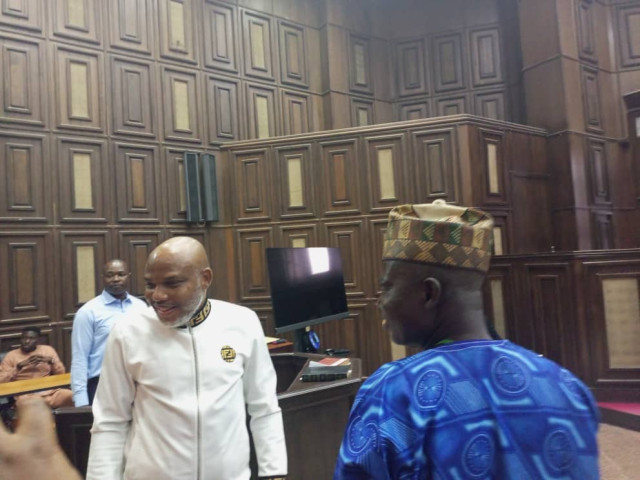The Federal Government on Friday, requested that the Federal High Court in Abuja dismiss the no-case submission made by Nnamdi Kanu, the detained leader of the banned Indigenous People of Biafra.
Adegboyega Awomolo (SAN), the lead counsel for the Federal Government, presented the argument in response to Kanu's no-case application.
Awomolo informed the trial judge, Justice James Omotosho, that Kanu had made statements on Radio Biafra openly expressing his intent to separate Nigeria.
He further claimed that Kanu not only threatened to break up the nation but also announced his intentions to establish a Republic of Biafra.
Awomolo stressed that Kanu's comments were not just empty threats, but a calculated and perilous declaration that instilled fear among Nigerians.
He contended that Kanu's boasts about dismantling Nigeria posed a severe national security threat and should not be regarded as mere rhetoric, as Kanu suggested.
Awomolo also accused Kanu of instructing his followers to target and kill police officers and their families, highlighting that over 170 security personnel were killed shortly after.
“The defendant boasted about being the IPOB leader despite knowing the group was banned, claiming that the world would pause,” he stated.
“Nigerian law criminalizes inciting statements that can instigate fear among citizens. The threat to obliterate Nigeria was serious and was aimed at forming Biafra, and there are repercussions for such pronouncements.”
He urged the court to deny the no-case submission and compel Kanu to present his defense, arguing that the application was both erroneous and unfounded.
Awomolo maintained that Kanu had a case to respond to concerning the seven counts of terrorism leveled against him by the Office of the Attorney General of the Federation.
On the other hand, Kanu, through his lead counsel, Chief Kanu Agabi (SAN), questioned the validity of the prosecution's assertions and requested that the court discharge and acquit him.
Agabi highlighted that no witnesses had testified to being incited to violence by Kanu during the trial.
He also pointed out that the five witnesses who did testify—all members of the Department of State Services—acknowledged their roles were limited to taking statements from Kanu.
Agabi further argued that no investigation was conducted regarding Kanu's purported statements, and no investigative report concerning the terrorism allegations was presented in court.
He noted that the charges against Kanu had been amended eight times, yet no witness testified that they had been incited by him.
Stating that Kanu merely called for people to defend themselves against rampant killings, Agabi contended that Kanu’s comment about “bringing the world down” was merely boastful and should not constitute evidence of terrorism.
He claimed that advising Nigerians to defend themselves is a constitutional right that has been echoed by notable figures, including retired General T.Y. Danjuma.
Agabi also criticized Kanu's prolonged solitary confinement over the past decade, arguing that international law prohibits solitary confinement for more than 15 days.
He concluded by insisting that the prosecution did not establish sufficient evidence for the terrorism charges and urged the judge to declare that no prima facie case existed against Kanu that would require him to mount a defense.
After considering the arguments for and against the no-case submission, Justice Omotosho adjourned the proceedings until October 10 for a ruling.




















